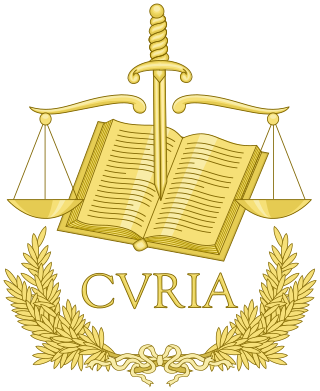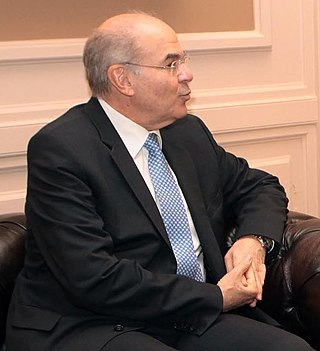Related Research Articles

The European Union (EU) is a supranational political and economic union of 27 member states that are located primarily in Europe. The union has a total area of 4,233,255.3 km2 (1,634,469.0 sq mi) and an estimated total population of about 447 million. The EU has often been described as a sui generis political entity combining the characteristics of both a federation and a confederation.

The Supreme Court of the United States (SCOTUS) is the highest court in the federal judiciary of the United States. It has ultimate appellate jurisdiction over all U.S. federal court cases, and over state court cases that involve a point of U.S. Constitutional or federal law. It also has original jurisdiction over a narrow range of cases, specifically "all Cases affecting Ambassadors, other public Ministers and Consuls, and those in which a State shall be Party." The court holds the power of judicial review, the ability to invalidate a statute for violating a provision of the Constitution. It is also able to strike down presidential directives for violating either the Constitution or statutory law. However, it may act only within the context of a case in an area of law over which it has jurisdiction. The court may decide cases having political overtones, but has ruled that it does not have power to decide non-justiciable political questions.

The European Court of Justice, formally just the Court of Justice, is the supreme court of the European Union in matters of European Union law. As a part of the Court of Justice of the European Union, it is tasked with interpreting EU law and ensuring its uniform application across all EU member states under Article 263 of the Treaty of the Functioning of the European Union (TFEU).

The General Court, informally known as the European General Court (EGC), is a constituent court of the Court of Justice of the European Union. It hears actions taken against the institutions of the European Union by individuals and member states, although certain matters are reserved for the European Court of Justice. Decisions of the General Court can be appealed to the Court of Justice, but only on a point of law. Prior to the coming into force of the Lisbon Treaty on 1 December 2009, it was known as the Court of First Instance.

A directive is a legal act of the European Union that requires member states to achieve a particular result without dictating the means of achieving that result. Directives first have to be enacted into national law by member states before their laws are ruling on individuals residing in their countries. Directives normally leave member states with a certain amount of leeway as to the exact rules to be adopted. Directives can be adopted by means of a variety of legislative procedures depending on their subject matter.

European Union law is a system of rules operating within the member states of the European Union (EU). Since the founding of the European Coal and Steel Community following World War II, the EU has developed the aim to "promote peace, its values and the well-being of its peoples". The EU has political institutions, social and economic policies, which transcend nation states for the purpose of cooperation and human development. According to its Court of Justice the EU represents "a new legal order of international law".

The European Communities (EC) were three international organizations that were governed by the same set of institutions. These were the European Coal and Steel Community (ECSC), the European Atomic Energy Community, and the European Economic Community (EEC); the last of which was renamed the European Community (EC) in 1993 by the Maastricht Treaty establishing the European Union. The European Union was established at that time more as a concept rather than an entity, while the Communities remained the actual subjects of international law impersonating the rather abstract Union, becoming at the same time its first pillar. In the popular language, however, the singular European Community was sometimes inaccurately used interchangeably with the plural phrase, in the sense of referring to all three entities. The European Coal and Steel Community ceased to exist in 2002 when its founding treaty expired. The European Community was merged with the second and third EU pillars by the Treaty of Lisbon in 2009, finally allowing the European Union to move beyond being only a concept and to assume the shape of a legally incorporated international organization with juridical personality, designated as the legal successor to the Community. However, the reformed EU has not become entirely unified, because Euratom, though governed with the EU by the common set of institutions, has been retained as an entity distinct from the EU, along with a number of other international entities, such as the European Investment Bank, the European University Institute, the European Stability Mechanism, and the Unified Patent Court.

The Charter of Fundamental Rights of the European Union (CFR) enshrines certain political, social, and economic rights for European Union (EU) citizens and residents into EU law. It was drafted by the European Convention and solemnly proclaimed on 7 December 2000 by the European Parliament, the Council of Ministers and the European Commission. However, its then legal status was uncertain and it did not have full legal effect until the entry into force of the Treaty of Lisbon on 1 December 2009.

Order and Justice, formerly the Liberal Democratic Party was a right-wing national-conservative political party in Lithuania that self-identified as "left-of-centre", at least on economic matters. It had eight members in the Seimas, the unicameral Lithuanian parliament, as of the last election it participated in (2016).

The Supreme Court of the United Kingdom is the final court of appeal in the United Kingdom for all civil cases, and for criminal cases originating in England, Wales and Northern Ireland. As the United Kingdom’s highest appellate court for these matters, it hears cases of the greatest public or constitutional importance affecting the whole population.

The European single market, internal market or common market is a single market comprising the 27 member states of the European Union (EU) as well as – with certain exceptions – Iceland, Liechtenstein, and Norway through the Agreement on the European Economic Area, and Switzerland through sectoral treaties. The single market seeks to guarantee the free movement of goods, capital, services, and people, known collectively as the "four freedoms". This is achieved though common rules and standards in which all the EU member states are legally committed to follow.

Vassilios Skouris is a Greek judge who was President of the European Court of Justice from 2003 to 2015. A European legal scholar, he served briefly in the government of Greece as Minister of the Interior in 1989 and again in 1996. He is professor at the Law School of the Aristotle University and at Bucerius Law School in Hamburg, Germany.

Sabine Leutheusser-Schnarrenberger[zaˈbiːnə ˈlɔʏthɔʏsɐ ˈʃnaʀənˌbɛɐ̯ɡɐ] is a German politician of the liberal Free Democratic Party and a prominent advocate of human rights in Germany and Europe. Within the FDP, she is a leading figure of the social-liberal wing. She served as Federal Minister of Justice of Germany from 1992 to 1996 in the cabinet of Helmut Kohl and again in the second Merkel cabinet from 2009 to 2013. In 2013, the new German government announced Leutheusser-Schnarrenberger's candidacy for the office of the Secretary General of the Council of Europe.

The Data Retention Directive, a directive, later declared invalid by the European Court of Justice, was at first passed on 15 March 2006 and regulated data retention, where data has been generated or processed in connection with the provision of publicly available electronic communications services or of public communications networks. It amended the Directive on Privacy and Electronic Communications. According to the Data Retention Directive, EU member states had to store information on all citizens' telecommunications data for a minimum of six months and at most twenty-four months, to be delivered on demand to police authorities.

The Treaty of Lisbon is an international agreement that amends the two treaties which form the constitutional basis of the European Union (EU). The Treaty of Lisbon, which was signed by the EU member states on 13 December 2007, entered into force on 1 December 2009. It amends the Maastricht Treaty (1992), known in updated form as the Treaty on European Union (2007) or TEU, as well as the Treaty of Rome (1957), known in updated form as the Treaty on the Functioning of the European Union (2007) or TFEU. It also amends the attached treaty protocols as well as the Treaty establishing the European Atomic Energy Community (EURATOM).

The judicial system of Sweden consists of the law of Sweden and a number of government agencies tasked with upholding security and rule of law within the country. The activities of these agencies include police and law enforcement, prosecution, courts, and prisons and other correctional services.
The European Union's (EU) Treaty of Lisbon, in force since 1 December 2009, requires the EU to accede to the European Convention on Human Rights (ECHR). Article 6 of the consolidated Treaty on European Union states "The Union shall accede to the European Convention for the Protection of Human Rights and Fundamental Freedoms. Such accession shall not affect the Union's competences as defined in the Treaties." The EU would thus be subject to its human rights law and external monitoring as its member states currently are. It is further proposed that the EU join as a member of the Council of Europe now that it has attained a single legal personality in the Lisbon Treaty.

The Court of Justice of the European Union (CJEU) is the judicial branch of the European Union (EU). Seated in the Kirchberg quarter of Luxembourg City, Luxembourg, this EU institution consists of two separate courts: the Court of Justice and the General Court. From 2005 to 2016 it also contained the Civil Service Tribunal. It has a sui generis court system, meaning ’of its own kind’, and is a supranational institution.

In the European Union, the advocates general are high-ranking functionaries serving in the European Court of Justice (ECJ). Modelled after the French commissaire du gouvernement, the position of advocate general was created together with the European Court of Justice in 1951, when the Treaty of Paris was signed.
References
- ↑ "The Court of Justice of the European Communities > The Members". European Court of Justice . Retrieved 2009-04-29.